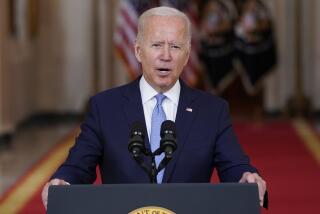A Hammer Falls on Iraq’s Piggy Bank in the Fading Days
- Share via
Now that Iraqi insurgents have discovered precisely where to aim their body blows at oil export facilities, Iraq is going to need all the money it can find. So it seems a pity that in its final days, the U.S.-dominated Coalition Provision Authority has gone on a shopping spree, gaily spending the hoard of Iraqi cash it controls.
Like everyone else in Iraq, the insurgents have long recognized that oil, almost the country’s only revenue resource, is the key to power. Since the beginning of the occupation, there have been no less than 125 sabotage attacks against oil pipelines. Until recently, most were in the northern oil fields, where little production goes for export, but lately, attacks have shifted to the southern fields, whence come 85% of Iraqi exports. Such gloomy realities appear to have little effect inside the CPA, where, reportedly, an “end of school” atmosphere has taken hold. This was most vividly expressed at a meeting last month at which it was decided to hand out almost $2 billion in Iraqi assets -- not American dollars but Iraqi money over which the U.S. authorities have assumed responsibility -- to a host of “deserving” causes.
The meeting was one of the regular get-togethers of the Program Review Board, a body operating under the auspices of the CPA that oversees spending by what is known as the Development Fund for Iraq, or DFI. The fund, created early in the occupation by the United Nations, has been receiving all the money earned by Iraqi oil exports plus all the money left over from the Hussein-era “oil for food” program, as well as any and all assets left behind by Saddam Hussein in Iraq and in foreign bank accounts. All in all, the fund has received more than $19 billion and has functioned as a piggy bank for the occupation authority, which has displayed a marked reluctance to account for money spent. Last November, for example, Congress -- with Halliburton in mind -- banned the use of taxpayers’ money for any more large noncompetitive contracts. So the CPA simply dipped into the DFI to pay Halliburton.
Those happy days are due to come to an end on June 30, which may be why the Program Review Board at its May 15 meeting cheerfully agreed to dole out $2 billion of the $10 billion remaining in the fund to what Iraq Revenue Watch, a George Soros-funded group, describes as “hastily conceived projects.” For example, the board members voted to approve $180 million for the CPA-controlled Iraq Property Claims Commission to deal with anyone whose property had been unjustly expropriated by Hussein. The commission representative, Duncan Gilchrist, conceded to the meeting that he could not provide details of how this vast sum was to be spent, or examples of similar programs elsewhere.
Nor were there details provided on where $125 million for “revenue stabilization” was going to end up, although an Iraq Revenue Watch briefing dryly notes that such funds tend to turn into “easily raided slush funds.” The $460 million allocated for “oil-sector reconstruction” might be easier to justify, save for the fact that Congress has already appropriated $1.7 billion for Iraqi oil infrastructure reconstruction. Needless to say, most of the contracts under that appropriation for a total of 226 projects went to Halliburton, which has not managed to finish a single project and has only started work on 119 of them.
The British representative at the Program Review Board meeting did ask why, given that there was still a billion dollars of the money voted by the U.S. Congress still unspent, they were dipping into the DFI. He was smartly told that there was “duplication of projects.”
The incoming post-June 30 Iraqi government that takes control of the development fund should not get any ideas about reversing this last-minute spree. The resolution passed by the U.N. Security Council on June 8 expressly requires this allegedly sovereign government to fulfill all obligations of the DFI incurred by the occupation authorities, however questionable or corrupt. As one Iraqi official remarked dolefully to me, “[Paul] Bremer could order 20 jumbo jets from Boeing with our money any time before June 30 and there is nothing we could do about it.”
The issue was serious even when Iraq was exporting 1.7 million barrels of oil a day. Now that the guerrillas have begun choking off Iraq’s income, the least the occupiers could do is keep a careful watch on money already in the bank.
Andrew Cockburn is the coauthor of “Out of the Ashes: The Resurrection of Saddam Hussein” (HarperPerennial, 2000).
More to Read
Sign up for Essential California
The most important California stories and recommendations in your inbox every morning.
You may occasionally receive promotional content from the Los Angeles Times.










